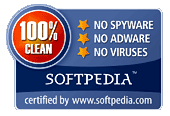
Get it, use it, contribute...
Attention: JCGO is not an
easy-to-use tool for real-world applications, so, in case of problems while
understanding JCGO, please contact the
author.

The JCGO v1.16 distributive files (unpacked to "C:\JCGO" or "/usr/share/JCGO"):
Additional third-party libraries (if needed):
Notes:
JCGO-SUNAWT integrates Sun J2SE AWT/Sound/SQL with JCGO.
JCGO-SUNAWT is currently distributed under the license terms of the Sun SCSL (for Research use only).
The JCGO-SUNAWT core distributive files (unpacked to "C:\JCGO" or "/usr/share/JCGO"):
The JCGO-SUNAWT re-distributive files:
Prerequisite third-party SDK:
For those who want to try out JCGO right now without looking into the accompanying documentation, here are the simple steps:
C:\JCGO" folder
C:\JCGO (preserving the
directory structure)
jcgo.exe (or java -jar jcgo.jar)
C:\MyJcgoProjects")
and change the current directory to it;
C:\JCGO\jcgo -sourcepath $~\examples Hello @$~\stdpaths.ingcc -IC:\JCGO\include -IC:\JCGO\include\boehmgc -IC:\JCGO\native -DJCGO_FFDATA -o hello jcgo_Out\Main.c C:\JCGO\libs\x86\mingw\libgc.acl -IC:\JCGO\include -IC:\JCGO\include\boehmgc -IC:\JCGO\native -DJCGO_INTNN -DJCGO_FFDATA -DJCGO_WIN32 -D_CRT_SECURE_NO_DEPRECATE -D_CRT_NONSTDC_NO_DEPRECATE jcgo_Out\Main.c C:\JCGO\libs\x86\msvc\gc.lib /link /out:hello.exehello.exe" file
If Linux/x86 is your development host, launch jcgo.jar file on any J2SE v1.4+ VM.
Here are the quick start tips if you choose the Linux version of JCGO:
/usr/share/JCGO" folder
/usr/share/JCGO (preserving
the directory structure)
java -jar /usr/share/JCGO/jcgo.jar -src $~/examples Hello @$~/stdpaths.ingcc -I /usr/share/JCGO/include -I /usr/share/JCGO/include/boehmgc -I /usr/share/JCGO/native -fwrapv -DJCGO_UNIX -D_IEEEFP_H -DJCGO_UNIFSYS -o hello jcgo_Out/Main.c -lm /usr/share/JCGO/libs/x86/linux/libgc.aThe following is still supported but not recommended for use:
All material on this web site is provided "as is" without warranty of any kind, either express or implied, including, but not limited to, the implied warranties of merchantability, fitness for a particular purpose, non-infringement or arising from a course of dealing, usage trade or practice.
Java™ and all Java-based trademarks and logos are trademarks or registered trademarks of Sun Microsystems, Inc. All other trademarks and copyrights mentioned in this documentation are the property of their respective holders.